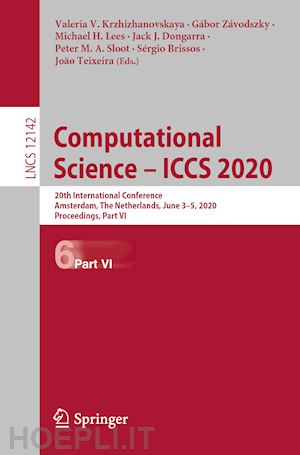
Questo prodotto usufruisce delle SPEDIZIONI GRATIS
selezionando l'opzione Corriere Veloce in fase di ordine.
Pagabile anche con Carta della cultura giovani e del merito, 18App Bonus Cultura e Carta del Docente
The seven-volume set LNCS 12137, 12138, 12139, 12140, 12141, 12142, and 12143 constitutes the proceedings of the 20th International Conference on Computational Science, ICCS 2020, held in Amsterdam, The Netherlands, in June 2020.*
The total of 101 papers and 248 workshop papers presented in this book set were carefully reviewed and selected from 719 submissions (230 submissions to the main track and 489 submissions to the workshops). The papers were organized in topical sections named:
Part I: ICCS Main Track
Part II: ICCS Main Track
Part III: Advances in High-Performance Computational Earth Sciences: Applications and Frameworks; Agent-Based Simulations, Adaptive Algorithms and Solvers; Applications of Computational Methods in Artificial Intelligence and Machine Learning; Biomedical and Bioinformatics Challenges for Computer Science
Part IV: Classifier Learning from Difficult Data; Complex Social Systems through the Lens of Computational Science; Computational Health; Computational Methods for Emerging Problems in (Dis-)Information Analysis
Part V: Computational Optimization, Modelling and Simulation; Computational Science in IoT and Smart Systems; Computer Graphics, Image Processing and Artificial Intelligence
Part VI: Data Driven Computational Sciences; Machine Learning and Data Assimilation for Dynamical Systems; Meshfree Methods in Computational Sciences; Multiscale Modelling and Simulation; Quantum Computing Workshop
Part VII: Simulations of Flow and Transport: Modeling, Algorithms and Computation; Smart Systems: Bringing Together Computer Vision, Sensor Networks and Machine Learning; Software Engineering for Computational Science; Solving Problems with Uncertainties; Teaching Computational Science; UNcErtainty QUantIficatiOn for ComputationAl modeLs
*The conference was canceled due to the COVID-19 pandemic.
Data Driven Computational Sciences.- A High-Performance Implementation of Bayesian Matrix Factorization with Limited Communication.- Early adaptive evaluation scheme for data-driven calibration in forest fire spread prediction.- Strategic Use of Data Assimilation for Dynamic Data-driven Simulation.- PDPNN: Modeling User Personal Dynamic Preference for Next Point-of-Interest Recommendation.- Cyber Attribution from Topological Patterns.- Applications of Data Assimilation Methods on a Coupled Dual Porosity Stokes Model.- Spatiotemporal Filtering Pipeline for Efficient Social Networks DataProcessing Algorithms.- Normal Grouping Density Separation (NGDS): a novel object-driven indoor point cloud partition method.- Machine Learning and Data Assimilation for Dynamical Systems.- Learning Hidden States in a Chaotic System: A Physics-Informed Echo State Network Approach.- Learning ergodic averages in chaotic systems.- Supermodeling: the next level of abstraction in the use of data assimilation.- A new multilayer network construction via Tensor learning.- Neural Assimilation.- A Machine Learning Method for Computing Rare Event Probabilities.- Node Classification in Complex Social Graphs via Knowledge-Graph Embeddings and Convolutional Neural Network.- Accelerated Gaussian Convolution in a Data Assimilation scenario.- Complementary Role of Data Assimilation and Machine Learning for a Truly Optimal Estimation System: An Example Derived from Air Quality Analysis.- Recursive Updates of Wildfire Perimeters using Barrier Points and Ensemble Kalman Filtering.- Meshfree Methods in Computational Sciences.- Finding Points of Importance for Radial Basis Function Approximation of Large Scattered Data.- High accuracy terrain reconstruction from point clouds using implicit deformable model.- Solving non-linear elasticity problems by a WLS high order continuation.- Advanced Radial Basis Functions mesh morphing for high fidelity Fluid-Structure Interaction with known movement of the walls: simulation of an aortic valve.- Radial Basis Functions Mesh Morphing - A comparison between the bi-harmonic spline and the Wendland C2 radial function.- Radial Basis Function Approximation Optimal Shape Parameters Estimation: Preliminary Experimental Results.- Multiscale Modelling and Simulation.- Projective Integration for Moment Models of the BGK Equation.- Open Boundary Modeling in Molecular Dynamics with Machine Learning.- Microtubule Biomechanics and the E?ect of Degradation of Elastic Moduli.-Formation of morphogenetic patterns in cellular automata.- Multilevel Monte Carlo with improved correlation for kinetic equations in the di?usive scaling.- Development and application of the Statistically Similar Representative Volume Element for numerical modelling of multiphase materials.- A heterogeneous multi-scale model for blood flow.- Towards Accurate Simulation of Global Challenges on Data Centers Infrastructures via Coupling of Models and Data Sources.- Easing multiscale model design and coupling with MUSCLE 3.- Quantum Computing Workshop.- Simulations of Quantum Finite Automata.- LibKet: A cross-platform programming framework for quantumaccelerated scientific computing.- Generalized Quantum Deutsch-Jozsa Algorithm.- Revisiting old combinatorial beasts in the quantum age: quantum annealing versus maximal matching.- A Quantum Annealing Algorithm for Finding Pure Nash Equilibria in Graphical Games.- Hybrid quantum annealing heuristic method for solving Job Shop Scheduling Problem.- Foundations for Workflow Application Scheduling on D-Wave System.- A Hybrid Solution Method for the Multi-Service Location Set Covering Problem.- New hybrid quantum annealing algorithms for solving Vehicle Routing Problem.- Multi-agent reinforcement learning using simulated quantum annealing.- Quantum Hopfield neural networks: A new approach and its storage Capacity.- A Variational algorithm for Quantum Neural Networks.- Imperfect Distributed Quantum Phase Estimation.- Optimal representation of quantum channels.- Perturbation of the numerical range of unitary matrices.- Design of Short Codes for Quantum Channels with Asymmetric Pauli Errors.- Simulation Methodology for Electron Transfer in CMOS Quantum Dots.











Il sito utilizza cookie ed altri strumenti di tracciamento che raccolgono informazioni dal dispositivo dell’utente. Oltre ai cookie tecnici ed analitici aggregati, strettamente necessari per il funzionamento di questo sito web, previo consenso dell’utente possono essere installati cookie di profilazione e marketing e cookie dei social media. Cliccando su “Accetto tutti i cookie” saranno attivate tutte le categorie di cookie. Per accettare solo deterninate categorie di cookie, cliccare invece su “Impostazioni cookie”. Chiudendo il banner o continuando a navigare saranno installati solo cookie tecnici. Per maggiori dettagli, consultare la Cookie Policy.